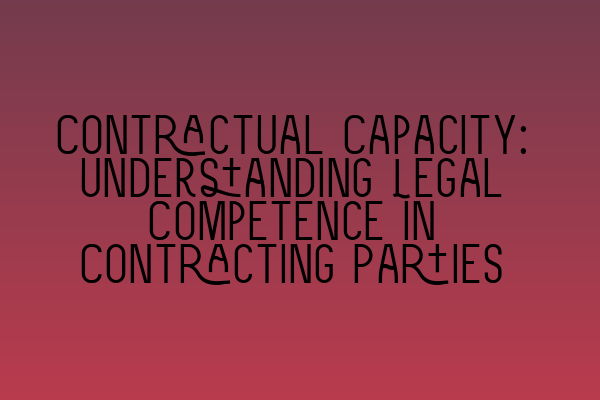Contractual Capacity: Understanding Legal Competence in Contracting Parties
When entering into a contract, it is essential to ensure that all parties involved possess the necessary contractual capacity. Contractual capacity refers to the legal competence of individuals to enter into a binding agreement. In this article, we will explore the concept of contractual capacity and its significance in contract law.
What is Contractual Capacity?
Contractual capacity refers to the mental and legal ability of a person to understand the nature and consequences of entering into a contract. It determines whether an individual has the power to create legally binding obligations and be held accountable for their actions under the contract.
It is important to note that contractual capacity is not the same as age or maturity. While age can be a factor in determining capacity, it is not the sole determining factor. A person can be of legal age but lack the necessary capacity due to mental incapacity or influence.
It is imperative for contracting parties, particularly solicitors, to assess the capacity of their clients before proceeding with any contractual agreement. Failure to do so can lead to the contract being deemed void or unenforceable.
Factors Affecting Contractual Capacity
Several factors may affect the contractual capacity of an individual. These include:
- Age: Age plays a significant role in determining contractual capacity. Minors, individuals below the age of 18 in the UK, generally lack the legal capacity to enter into contracts. However, certain exceptions exist, such as contracts for necessaries (goods or services necessary for the minor’s well-being) or contracts approved by the court.
- Mental Incapacity: Individuals suffering from mental illness, intellectual disabilities, or under the influence of drugs or alcohol may lack the mental capacity to understand the terms of a contract and its implications. In such cases, the contract may be voidable if the party lacking capacity can prove their incapacity.
- Intoxication: Contracts entered into while under the influence of drugs or alcohol may be voidable if the intoxicated party can demonstrate that they lacked the requisite capacity at the time of entering the agreement.
- Undue Influence: If one party exerts undue influence to pressure or manipulate the other party into entering into a contract, the agreement may be considered voidable. Undue influence can undermine the voluntary consent required for a contract to be valid.
Legal Consequences of Lack of Contractual Capacity
If a party lacks the necessary contractual capacity, the contract may be void, voidable, or unenforceable. Understanding the legal consequences is crucial to protect the interests of all parties involved.
Void: If a contract is void, it is considered legally invalid from the beginning. It has no legal effect, and the parties are not bound by its terms. For example, if a person enters into a contract while they are declared mentally incapacitated by a court, the contract would be considered void.
Voidable: A contract that is voidable remains valid until the party lacking capacity chooses to disaffirm it. The party lacking capacity has the option to affirm or reject the contract once their capacity is restored or a court deems the contract voidable. For instance, if a minor enters into a contract for the purchase of a car and decides to disaffirm the agreement before reaching the age of majority, the contract would be voidable.
Unenforceable: An unenforceable contract is one that may be valid, but for various legal reasons, a court cannot enforce it. For example, if a contract is entered into under undue influence, it may be considered unenforceable due to the lack of genuine consent.
Conclusion
Understanding contractual capacity is fundamental in contract law. Solicitors and contracting parties must ensure that all parties involved possess the necessary legal competence to enter into a binding agreement. Failure to assess and address contractual capacity issues can have severe legal consequences.
For further insights into legal practice and decision-making, check out our related article: Unveiling Real-Life Case Studies: Insights into Legal Practice and Decision-Making.
Are you interested in exploring solicitor salaries in the UK and the factors that affect income? Read our informative article: Exploring Solicitor Salaries in the UK: Average Earnings and Factors Affecting Income.
Wondering how to enhance trust and loyalty through effective client relationship management? Discover key skills for solicitors in our article: Mastering Client Relationship Management: Skills for Solicitors to Enhance Trust and Loyalty.
If you’re considering a law school education in the UK, our article on choosing the right path for your future can provide valuable guidance: Pursuing a Law School Education in the UK: Choosing the Right Path for Your Future.
For aspiring solicitors, securing training contracts is a crucial step. Explore our roadmap to becoming a solicitor in our comprehensive article: Securing Training Contracts: A Roadmap to Becoming a Solicitor.
